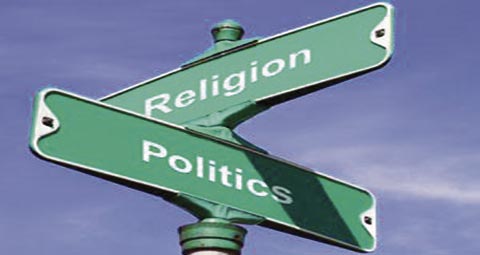The church is called to be the community of believers in Christ in which the fullness of God exists through the power of the Spirit. You can read my previous post, Comprehensive Faith, Pt. 1: The Gospel and the Church, to get a fuller explanation of this calling, which is expressed in Ephesians 3:14-21. However, we can stifle this work of God and hinder his fullness from manifesting within us.
Sex, money, and power can certainly stifle the work of God among us but most of us know the perils of such vices. Then there is religious pluralism but most Christians I know understand that Jesus isn’t just a way but the way of salvation. So what could be so distracting to our faith today?
In The Screwtape Letters, C.S. Lewis employs satire to explore how the satanic enemy can weaken the faith of Christians. In the 15th letter, Screwtape says to Wormwood, “Our business is to get them away from the eternal, and from the Present.” Then a little later in the letter, Screwtape writes:
But we want a man hag-ridden by the Future—haunted by visions of an imminent heaven or hell upon earth—ready to break the Enemy’s commands in the present if by doing so we make him think he can attain the one or avert the other—dependent for his faith on the success of failure of schemes whose end he will not live to see. We want a whole race perpetually in pursuit of the rainbow’s end, never honest, nor kind, nor happy now, but always using as mere fuel wherewith to heap the altar of the future every real gift which is offered them in the Present.
If follows then, in general, and other things being equal, that it is better for your patient to be filled with anxiety or hope (it doesn’t much matter which) about this war than for him to be living in the present.
The hag-ridden state that Lewis mentions has played out time and time again. The distraction from the eternal comes by way of fear and discontentment that can breed repulsion and contempt. This is how tribalism, nationalism, racism, and even denominationalism begin to take precedence among Christians. This is why we better pay attention to what is going on right now in America.
For years now various talking heads have built their platforms by stoking fear, arousing anger, and sowing division. finger at the other side. This happens on both the right and the left, and Christians are not immune. In an article titled The Evangelical Church is Breaking Apart, Peter Wehner described how partisan-politics is creating turmoil among Christianity because too many Christians are choosing partisan political ideologies over the gospel.
Matt Chandler, who is the pastor with The Village Church in Texas, recently made a similar observation during an interview with Church Leaders. He was being asked how he, as a pastor, addresses issues like race, the presidential election, and COVID-19 vaccinations. In part of his response, Chandler said, “There is a failure of the church over the last 20, 30 years that there doesn’t seem to be a theological understand of what the church is meant to be that has more power than these ideological tribes that have formed. People are really choosing their ideology over doctrinal faithfulness.” That seems important but the concern can’t be just about the partisan-politics and ideological tribalism. The concern has to about how this is happening because it hasn’t happened over night. So how does this happen?
Well, back in the article by Peter Wenher, James Ernest is quoted as saying, “What we’re seeing is massive discipleship failure caused by massive catechesis failure.” In other words, there has been a negligence in teaching the meaning of the gospel resulting in a discipleship failure.” To this negligence, Alan Jacobs is also quoted as saying, “People come to believe what they are most thoroughly and intensively catechized to believe, and that catechesis comes not from the churches but from the media they consume, or rather the media that consume them. The churches have barely better than a snowball’s chance in hell of shaping most people’s lives.”
I hope Jacobs is wrong regarding the chance churches have in the faith formation of people but that’s why we need to hear the meaning of the gospel again and again. It may be time for some Christians to give up the cable news channels, the podcasts and YouTube channels. What I do know is the word of God here in Ephesians 3. It’s a prayer asking that we would be strengthened by the Spirit so that we Christ will dwell within us so immensely that we are grounded in the love of God and therefore fulled with the fullness of God. May God the Father, Son, and Spirit fulfill this prayer among us today and forever!


 I didn’t watch the Democrat or Republican convention’s this year. I recognize the necessary role of politics in a civil society but I can read what the various speakers have to said without all the unnecessary hype. My interest here isn’t opining on the many claims, promises, etc… made by those running for office but I do have at least one exception. When politicians use Christian language, co-opting ideas and even the words of scripture for their own political end, I am compelled to say something because I find it troubling.
I didn’t watch the Democrat or Republican convention’s this year. I recognize the necessary role of politics in a civil society but I can read what the various speakers have to said without all the unnecessary hype. My interest here isn’t opining on the many claims, promises, etc… made by those running for office but I do have at least one exception. When politicians use Christian language, co-opting ideas and even the words of scripture for their own political end, I am compelled to say something because I find it troubling. 


